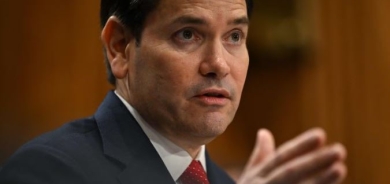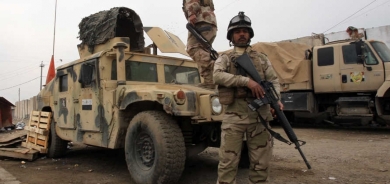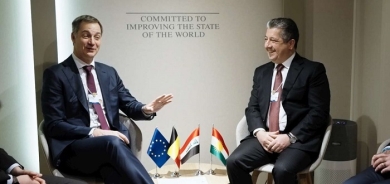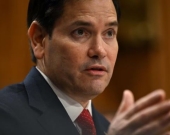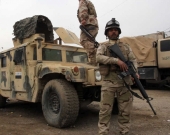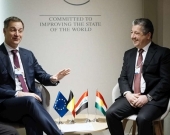Turkish Kurds Optimistic Ahead of Presidential Vote but Worried About Region

Now his business has grown into one of the country's top dealerships, surrounded by other commercial and residential developments, and he is looking to expand across the region.
"This land has a bright future ahead," said Mr. Tolog. "I feel more hopeful now that we don't have funerals every day," he said, referring to the years of armed struggle in which more than 40,000 people, mostly Kurds, were killed.
The wave of optimism has been underpinned by almost two years of stability in Turkey since Prime Minister Recep Tayyip Erdogan's government began peace talks with the Kurdistan Workers' Party, or PKK.
It has been bolstered by a surge in investment in the region as Ankara has gradually lifted strict curbs on Kurdish political and cultural expression—long unthinkable in a country with a strong nationalist streak.
At the same time, Kurds in neighboring Iraq have taken significant steps to broaden their own autonomy—capturing oil-rich territory and attempting to export petroleum products without involving Baghdad.
However, while Turkish Kurds have become potential kingmakers in the country's first direct presidential election on Sunday, some also worry that developments across the border could jeopardize their recent gains.
"The Kurds have now stepped on the stage of history, they are being listened to, and they are proposing their own political solutions for themselves," said Gultan Kisanak, co-mayor of Diyarbakir—the de facto capital of Turkey's Kurdish region—and member of the Peace and Democracy Party.
"But I hope Iraqi Kurds won't declare independence at any cost," Ms. Kisanak said, echoing fears that a unilateral move could further destabilize the region.
Iraqi Kurds have been battling Sunni militants in a bid to protect their expanding autonomy. In a sign of growing alarm, Iraq's central government sent its air force Monday to back the Kurdish Peshmerga forces against the Islamic State jihadists, who are fighting both in Iraq and Syria.
Kurds are considered the largest ethnic group without a state, and their fate in Iraq will reverberate across the region. Roughly half of the estimated 30 million Kurds live in Turkey.
The advances by Kurds in Iraq and Syria—where a PKK affiliate party, the PYD, has carved out a self-governing enclave—are increasing the pressure on Ankara to step up the peace process.
Mr. Erdogan has been accused by opposition parties of creeping authoritarianism during his more than a decade as prime minister. But many Kurds still say they believe he is their best hope for peace, although they worry that his government hasn't spelled out its final proposals.
To be sure, the peace is still fragile and unrest erupts frequently in southeastern Turkey, where the human-rights record remains the poorest in the country.
In June, the police shot dead two Kurdish civilians near Diyarbakir for protesting the construction of a new military post. A mass trial continues against hundreds of Kurdish politicians, writers and professionals accused of membership in or aiding the PKK, despite the release of some political prisoners in Diyarbakir in recent months.
Turkish Kurds aren't seeking to secede but want more autonomy to empower elected leaders of Kurdish-majority provinces and loosen Ankara's grip in local affairs. Other demands include Kurdish-language education and allowing PKK militants to return from their mountain camps in Iraqi Kurdistan and to participate in politics.
The government rebooted the peace process in early July, passing a bill formalizing the talks and ensuring legal immunity to officials involved—an apparent precaution against possible resistance in the bureaucracy and judiciary.
Mr. Erdogan would be practically assured of victory in the first round of voting for president Sunday if he could secure the support of the Kurds, who constitute at least 15% of the population.
But in the southeastern, Kurdish-majority provinces, Mr. Erdogan faces a tough battle against a Kurdish candidate, Selahattin Demirtas, co-chairman of the recently founded, pro-Kurdish Peoples' Democratic Party.
Many in Diyarbakir say they prefer their own homegrown candidate, and Mr. Demirtas has also succeeded in winning some support from voters disillusioned with the old opposition parties in western Turkey.
Although polls show him with less than 10% support nationwide, Mr. Demirtas said in an interview that a "crushing majority" of votes for him in the Kurdish region would strengthen the Kurds' hand in the peace talks.
"A serious increase in my votes would definitely create pressure on the government to take the peace process more seriously and take concrete steps to advance it," he said.
In the ancient bazaars and labyrinthine streets of Diyarbakir, locals are hoping the period of expanded autonomy in Kurdish regions across the Middle East is here to stay.
"We're very curious to see what will happen in northern Iraq now," said Kurdish shopkeeper Feridun Akin, 55 years old, as he prepared to close for dinner. "Perhaps Turkey can become a confederation at the end of the peace process."
WSJ


